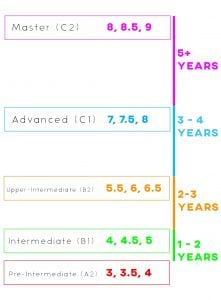Be sure to avoid the mistakes that most students make on writing by signing up for my exclusive IELTS Ebooks here on Patreon.
I want to tell you a story about how I learned how to decide if students should be studying IELTS or just improving their English based on what score they need and when.

Dave, your friendly, neighborhood former IELTS examiner!
As a teacher at British Council we test student’s level in order to put them in the correct class. It’s very important and one of the most important questions is: should this student be studying IELTS or improving their English first?
Your current level of English will tell you exactly how long before you can get the score that you want.
That sounds obvious but few students understand that IELTS is a test made to measure English language ability and it will do just that – measure your ability.
I was lucky when I first started level testing because I had an amazing and experienced teacher who showed me, like a doctor, exactly how to diagnose students.
What she showed me was basically this: after you know their English level, find out what score they need and when they need it. If they are far away from their goal – put them in general English. If they are close to their goal – an IELTS class.

You can read here why you shouldn’t be studying IELTS if you are far from your goal.
These are general rules and there are exceptions depending on your ability and determination (Leo Tolstoy became fluent in Ancient Greek in just six months for a challenge, but he’s probably a lot smarter than you are).
Take a look at the chart on the left to get an idea of how long it will take.
I want to point out 2 things about this chart.
First, this is based on the official IELTS and CEFR website. Most examiners would say that the link between level and band score is not totally accurate. An intermediate student could easily get around a 6 and and upper-intermediate could get around a 7.
Second, the jumps between levels get larger. It takes longer to go from band 6 to 7 than it does from band 5 to 6.
It is always possible to get a score that is better than what you deserve (though it is more likely to get one that is lower than what you deserve).
Very few students understand this. They think if they moved up a point in a year they can expect to keep doing that until they get to band 9.
That’s not how it works. Read below for some examples of how long it will take you to move up to the next band score or level.
Example #1: Elementary Level (A1)
This is a really low level of English and students at this level should only expect to get around a 3 to 4 on IELTS.
Many students at this level come in asking for a 6.5 – that isn’t a realistic goal.
If an elementary student wants a 6.5 in a few months, I tell them the truth: it is impossible.
In these cases, I always put students into general English.
What this means for you: If you are an elementary level student you should not be studying IELTS unless if you need below a 4. You should be improving your English.
How? Here is how you can watch videos and improve, here are some tips on studying the right kind of vocabulary, and here is how you can read the news to improve.
Let me repeat myself: at this level you should not be studying IELTS – you should be improving your English in general.
Maybe you think you can study IELTS to improve your English. You’re wrong and you can read about why here: Why you Shouldn’t Study IELTS to Improve your English.
The good news for you elementary students is that moving from elementary to pre-intermediate won’t take that long. It’s simply a matter of learning new vocabulary and practicing using it with some different types of grammar and you’ll be there in under a year!
In summary: to get up to 6+ will take you at minimum of 2 years of study and likely longer. Under 6 is possible inside of 1 or 2 years.
Example #2: Pre-Intermediate Level (A2)
As your English level increases, it will begin to take longer and longer to improve and reach the next level. Think of it like a staircase where the next step gets bigger and bigger.
A pre-intermediate student can expect a score in the 4 range, possibly up to 5.
This means if you are pre-intermediate and you want a 6.5 you are very far from your score and should not be studying IELTS (for more information read why here).
If you need a 5.5, possibly even a 6, you can try studying IELTS but there is a very low chance you will reach your desired score.
This might depend on your time frame. If you want a 6.5 or 7 in 3 months it is not possible. But if you have a full year to prepare you will have a better chance of getting a 6.
For these students, unless if they need a score below a 6, I always recommend improving their English, not studying IELTS.
The good news is that going from pre-intermediate to intermediate level is very possible. It is not as easy as going from elementary to pre-intermediate, but most students can do it by working hard within 1-2 years.
Example #3: Intermediate (B1)
If you want are at the intermediate level you should expect a score in the 5 range, possibly up to band 6.
This means that 6.5 is a possibility, but very rare.
If a student is Intermediate level and needs a 6.5 in a few months then I would recommend they study IELTS because this score is possible.
If they want a 6.5, there is a slight chance they could get there, especially if they are good in reading in listening. Many students get 6 for speaking and writing and 7 for reading and listening and end up with a 6.5 overall.
Students who want to get a 6.5 need to spend some time (at least 6 months to a year) improving their English in order to have a good chance of getting that score.
Moving from intermediate level to upper-intermediate is a huge jump up.
Upper-intermediate is where you English becomes more natural; it is sometimes known as the ‘dinner party’ level. I could have a good conversation at a dinner party with an upper-intermediate student.
To move from intermediate to upper-intermediate you should plan to spend at least 1 – 2 years. For many students, you are more likely to need 3 – 4 years of intensive study to reach upper-intermediate level.
Example #4: Upper-Intermediate (B2)
At Upper-Intermediate you should expect a band score in the 6 range, but possibly up to a 7.
Getting to this level is a huge accomplishment and you should be really proud of your level. It can take many years to get here!
Students at this level are usually ready to study IELTS rather than just improve their English.
The only situations where I would recommend someone continue to improve their English rather than study IELTS is if they need above a 7.
In that case, you probably need at least another couple of years of study in order to get that band score.
But, many students are able to get 7 overall (or even higher) because of the difference between skills. Most students have stronger listening and reading skills so it is very common for students to get 6s for speaking and writing and 8s for listening and reading, which averages out to a band 7 overall.
If you are at the upper-intermediate level and you need an 7 – it is possible, but only if you are a very strong upper-intermediate and you can get great scores for listening and reading.
Example #5: Advanced (C1)
At the advanced level you should expect a band score around band 7, including 7, 7.5, and 8.
This level means that your English is becoming very natural and similar to a native speaker.
The best way of thinking of this level is thinking about your native language. Now think about being slightly worse in English than your native language.
How long do you think that will take you?
For many people, this level is unattainable. Some study their whole lives and never reach it.
If you want to get to this level you need to practice all the time and show real dedication or go live abroad and immerse yourself in English every day.
It’s hard to give a realistic time frame for this level, and these IELTS bands, because it takes a lot of time and hard work but varies by learner more than the other levels.
Keep your head down, work hard, and enjoy the journey without focusing too much on the finish line because it is probably years away!
The more you think about getting band 8, rather than just getting better at English, the less likely you will be to ever get band 8.
Example #6: Master (C2)
Once you have your black belt in English you are looking at an 8, 8.5 or 9.
You are essentially a native speaker though you might make some mistakes. Obviously at this level you don’t really need to study IELTS.
You can just take the test and you’ll probably get a score that’s good enough.
However, there is 1 reason why you might want to study IELTS.
There are a lot of tricky little elements to IELTS, especially in the writing test, that can even cause native English speakers to get lower scores than what they deserve.
You might want to take a short course or review some key elements of test strategy just to be safe. Some students are at band 8 but they don’t know how to do the test so they get a 7 or 6. That means with just a little bit of study they could move up 1 or 2 full band scores!
Overall or at Least in Every Band?
Another factor that has a huge impact on how long it takes to get your score is whether you need an overall band score or a minimum in each category or a combination of both.
It is very common for schools to ask for a 6.5 overall and nothing lower than a 6 in every category.
This means your skills have to be well-rounded. You won’t be able to get away with really good listening and reading scores and poor speaking or writing scores. If one of your skills is weaker than the others, it might take you longer to make sure every skill is good enough.
Generally, if you need to get at least 6 or 6.5 or 7 in every category, it will take you longer to prepare and you might have to take the test multiple times. This means it is even more important that you figure out your current scores and come up with a good study plan.
On the other hand, if you only need an overall score you have a better chance of getting the score you want.
You should check with the school, company or immigration office to find out if you just need an overall score or a minimum in each skill.
There Are Levels Above Master
Not a lot of people know this because the new CEFR levels have not been released yet and are still being worked on.
I have talked personally with one of the researchers and was interested to learn that the next CEFR will detail levels above Master (C2).
Don’t worry – these are not going to be part of IELTS. There won’t be a band 10 and 11!
But if you are interested the other levels are called ‘G’ and include Translator (G1), Bilingual (G2) and Confident User (G3).
Let’s hope these don’t become part of IELTS anytime soon…
Comment below: How long until you need your IELTS score?
Here’s some help getting started with your comments:
I really need it by …
If I don’t have my score around … then I will have to …
It’s important for me to get my score by …
It’s flexible for me. Anytime in the next … months/years.







Need 7 in all modules.
Best of luck!
Hey, hope you’ll be doing fine. i took an online test to assess my English level and it was B1 (approx,. Intermediate) . As per your information it c’ld take 1-2 years for me to get a band of 7… I dont have much time for that.. Cld you please guide me how and wgere to start?
Sure! Where did you take the test? When do you need your score by? Have you taken IELTS before?
many mistakes on your writing.
Can you be more specific?
Hi my friend; thank you for this article. By the way, just have a look at these examples for your writing, please:”especially if they are good in reading in listening.” “Upper-intermediate is where you English becomes more natural;”
Hi,
I got 6 over all .. 7 speaking, 5.5 in other skills (reading, writing, listening)
Looking for band 7 … how long do you think I need to get 7 in each skill ( can’t be less than that) and 7 over all
It’s hard to say exactly Albert because it depends on how fast you learn and how much time you are willing to put in daily.
How much time do you have to study each day?
Hi there, I got a question about the IELTS band 6 and 7 descriptors for GRA concerning the difference. As I understand it, according to the band descriptors, for a band 6 the structures my essay should.contain are complex sentences (that is, subordinate clauses and relative clauses) and some other complex forms.If I want to get a band 7 in GRA, I need to add other complex structures (complex verb patterns, modals, passives, complex noun phrases) besides the complex sentences. Am I right?
It isn’t quite so specific – it’s not like the examiner will make a list of the grammar that you use – but try to use a good variety in a flexible way. If it sounds like you are forcing it in, then that isn’t helpful.
Balance accuracy and complexity in order to communicate your ideas clearly.
Is that clear, Aldo?